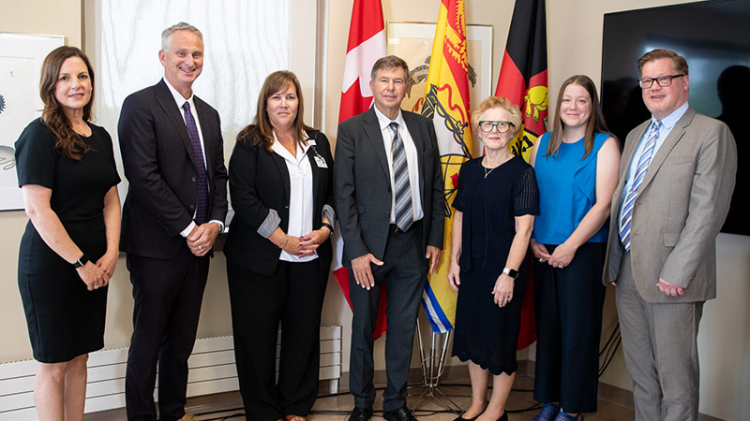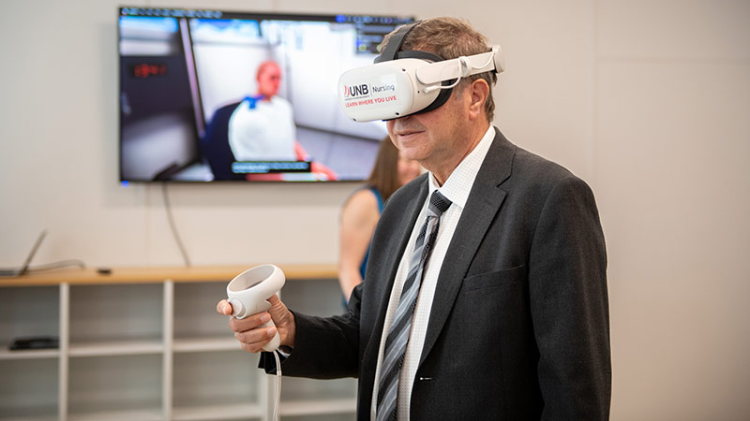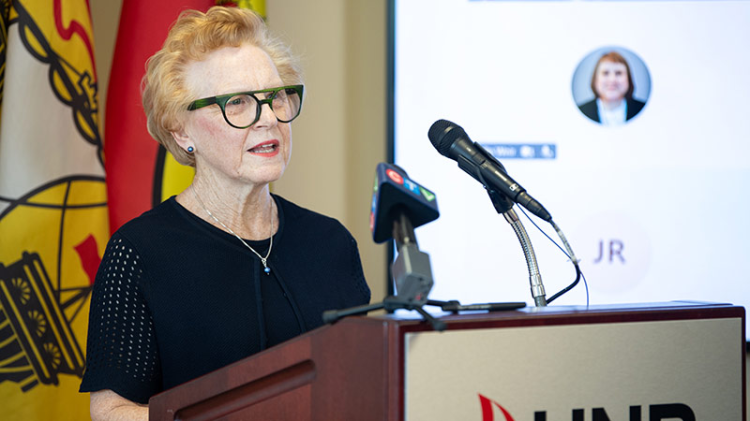The Government of New Brunswick is committing $500,000 over three years to support a new teaching model at the University of New Brunswick (UNB), designed to prepare the next generation of nurses.

Taking part in the announcement were, from left, Gillian Ferris, vice-president operations enhanced care (NB) Shannex; William Best, vice-president, administration & finance UNB; Kerry Kennedy, executive director talent acquisitions Horizon Health Network; Hon. John Dornan, Minister of Health; Dr. Lorna Butler, dean, faculty of nursing; Renée Gordon, teaching professor and clinical resource strategist, UNB Moncton site; and Dr. Don Leidl, assistant professor, UNB Moncton site.
Health Minister John Dornan announced the funding on June 26 on UNB's Fredericton campus. The investment will support infrastructure, equipment and setup costs for an extended reality (XR) education model in clinical practice.

Hon. John Dornan, Minister of Health, tries out extended reality (XR) equipment.
"This innovative enhancement will replicate real-world clinical experiences and scenarios that students will face as a registered nurse," said Dornan.
"Health care is evolving, and so is the way we meet the educational needs of our future nurses. This project will allow for powerful immersive learning experiences to meet students' learning needs and ensure New Brunswick continues to recruit and retain high-quality, qualified nurses for our workforce."
The initiative builds on UNB's Learn Where You Live (LWYL) program, launched in 2021. That program uses virtual reality (VR) to enable licensed practical nurses across New Brunswick to pursue bachelor's degrees in nursing remotely.
Clinical practicums are essential in nursing education but are increasingly difficult to secure due to nursing shortages and fewer qualified clinical supervisors.
To address this, UNB's faculty of nursing proposed the XR model to the Department of Health. It enhances students' clinical skills, critical thinking and judgment by simulating real-world healthcare conditions.
Facilities will include simulation and medication suites, as well as 14 XR stations at the Fredericton campus and the Moncton site. UNB will work with Horizon Health Network and Shannex to align the curriculum with current nursing practices and technologies.
Using complementary technology, faculty can assess and evaluate student performance in achieving program outcomes. Students can practise until they are proficient, without real-world consequences, and shorten the time it would take for them to learn those tasks in a placement.
The program will launch in September, with UNB's Spatial Computing Research Centre (SPECTRAL) continuing its technical partnership.
SPECTRAL is an applied research centre that develops VR, augmented reality and mixed reality technologies for sectors including education, healthcare and aerospace.
Dr. Lorna Butler, dean of the faculty of nursing, noted that the new funding will fuel further progress, building on existing technology-driven success.

Dr. Lorna Butler, dean, faculty of nursing.
"Since 2019, we have increased rural placements across 23 new communities, health-related summer camps and correctional facilities. The number of nursing students in rural New Brunswick inspiring local youth as nursing role models has increased by 268 per cent, rising from 71 in 2019 to 261 in 2024," she said.
"The outcome of this success is making nursing education accessible to students who may not be able to come to campus. Using technology, we successfully took the university to the community in our LWYL Program."
Butler said the new XR project will bring the clinical setting into the classroom and will allow the faculty to support clinical partners by relieving pressure on the healthcare system as the sole source of practical experience.
"Together with our partners at Horizon Health Network and Shannex, we will enhance the clinical experience for both students and practising nurses to achieve the competencies necessary for high-quality nursing care," she said.
"Nursing education has been slow to change. Globally, we have retained the same model of clinical teaching for over 60 years. We need to evolve and adapt our programs.
"UNB offers a global solution."













